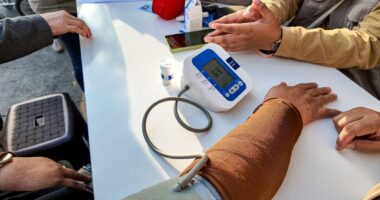Share this @internewscast.com
The pancreas is an organ located in the abdomen, just behind the stomach. Its main functions are to help with the digestion of food and control blood sugar.
Cancer of the pancreas is the 10th most common type of cancer in the UK, but the fifth most deadly. It accounts for almost 10,000 deaths every year – or 26 a day.
Part of what makes the disease so deadly is the fact that it can be symptomless. Or symptoms can be “hard to spot”, according to the NHS.
Some symptoms can also appear in the most unlikely places, meaning they could easily be mistaken for something else.
One such symptom can even appear in the feet and ankles.
Pancreatic Cancer UK describes how patients with the pancreatic cancer who are “approaching the end of their life” may get a build up fluid in their legs and feet.
This is known medically as oedema and causes swelling that can be uncomfortable and painful.
It can also make it difficult to move around properly.
The charity explains: “Fluid may also build up in other parts of your body, such as your arms, legs and feet. This can cause swelling, and is called oedema.
“Some people also get oedema in their genitals. Oedema can be uncomfortable and painful and can make it harder for you to move around.”
The disease can also cause fluid to build up in the abdomen, which is a condition known as ascites.
“You may have swelling in your tummy and you may feel full quickly when you eat,” Pancreatic Cancer UK says.
“You might find it harder to move around and may get breathless. If you have any of these symptoms, tell your doctor or nurse.
“You may also find it difficult to get comfortable when lying down, or on your side. You may find it more comfortable to use pillows to prop yourself up when you sleep.”
Other symptoms
Other symptoms of pancreatic cancer can include:
- The whites of your eyes or your skin turn yellow (jaundice), and you may also have itchy skin
- Darker pee and paler poo than usual
- Loss of appetite or losing weight without trying to
- Feeling tired or having no energy
- A high temperature, or feeling hot or shivery.
The NHS states that the disease can also affect your digestion.
This can cause:
- Feeling or being sick
- Diarrhoea or constipation, or other changes in your poo
- Pain at the top part of your tummy and your back, which may feel worse when you’re eating or Lying down and better when you lean forward
- Symptoms of indigestion, such as feeling bloated.
If you experience any symptoms of pancreatic cancer you should speak to your GP.
It is not always clear why someone develops pancreatic cancer but you are at higher risk for the disease if you:
- Are over the age of 65 – it’s not very common in people under 40
- Have certain medical conditions, such as chronic pancreatitis
- There’s a history of pancreatic cancer in your family.
Odema does not necessarily mean you have pancreatic cancer. It can have some less-serious causes such as standing or sitting in the same position for too long, eating too much salty food, being overweight, being pregnant and taking certain medicines.
However, it can also be caused by:
- An injury – such as a strain or sprain
- An insect bite or sting
- Problems with your kidneys, liver or heart
- A blood clot
- An infection.











